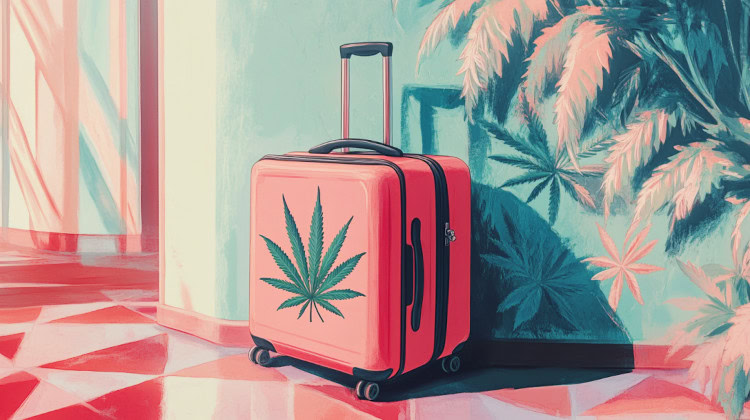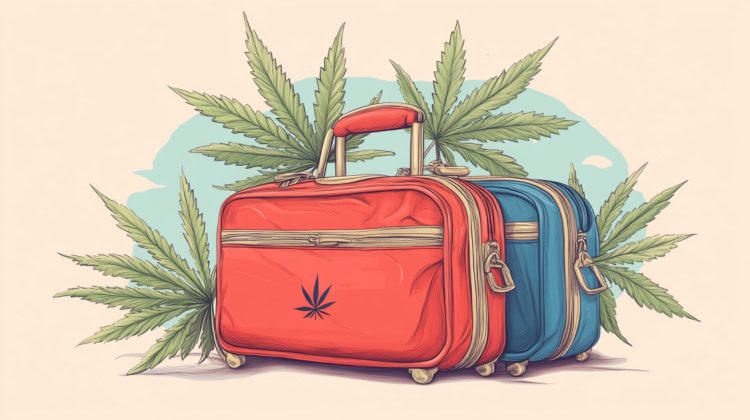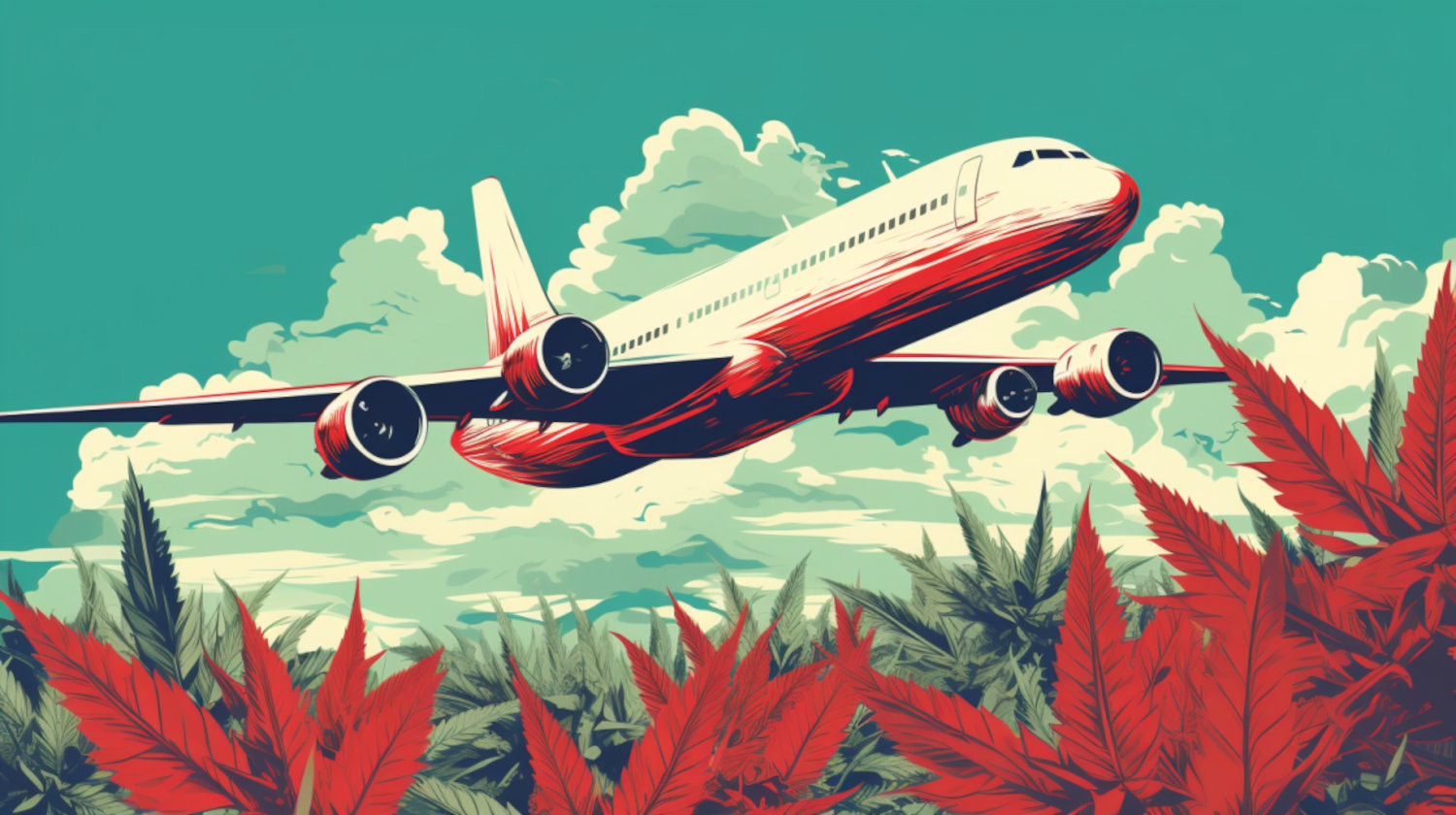In This Article
- What is Cannabis Tourism?
- Is Weed Legal in Other Countries?
- Where Can You Travel with Weed?
- Where Should You NOT Travel with Weed?
- Best Places to Go on a Weed Vacation
- Tips for Traveling Patients
- Know the Laws Before You Go
- Can You Fly With Medical Cannabis?
- Thinking About Bringing Weed on a Cruise?
- Driving? Keep It Stored Safely
- Using Cannabis at Your Destination
- Weed Vacation FAQs
- What is the best city for 420?
- What are the most anti-weed states?
Key Takeaways
- San Fransisco, Portland, and Denver are among the best cities in the US to visit for cannabis.
- Canada, Uruguay, and Thailand have all legalized cannabis nationally, making them weed-friendly vacation spots.
- Do not travel with cannabis in your possession. There can be serious legal penalties. Always purchase it legally when you arrive.
Weed-friendly vacations are more popular than ever, with travelers seeking out destinations where they can buy, consume, and experience cannabis without hassle.
Some places make taking a weed vacation easy, offering dispensaries, cannabis lounges, and even tours of legal grows. Others have stricter rules, even if weed is legal. Knowing where to go, and what to expect, can make all the difference.
What is Cannabis Tourism?

Cannabis tourism involves traveling to places where you can buy and enjoy weed, and there’s a 420-friendly experience for every type of traveler. At some destinations, it’s more than just hitting up a legal dispensary; there are lounges, guided grow tours, and even full-on weed resorts.
In legal states and countries, cannabis tourism has become a booming industry. San Francisco, Denver, and Portland are known for their weed-friendly culture and places like Mendocino County offer a look inside California’s legendary cannabis farms.
Is Weed Legal in Other Countries?
Cannabis laws vary, sometimes drastically, depending on where you go. Some countries have fully embraced legalization, while others have strict penalties for possession.
Where Can You Travel with Weed?
In Canada, Uruguay, and Thailand, recreational cannabis is legal at the national level. This makes them some of the easiest destinations for a weed-friendly trip.
Other countries, like Germany and Malta, have recently moved toward legalization. However, they still have restrictions on where and how cannabis can be consumed. Australia has legalized medical cannabis federally, while recreational use remains illegal in most areas.
Still, you should keep in mind that traveling with cannabis in your possession is a risky prospect, regardless of the destination. It's always better to leave your weed at home and purchase some legally when you arrive.
Where Should You NOT Travel with Weed?
Some nations strictly prohibit cannabis. Japan (Tokyo), Singapore, and Indonesia (Bali) have zero-tolerance policies. Even for tourists, there are severe penalties for possession. These can include years in prison, heavy fines, and even the death penalty for trafficking.
In Europe, Greece allows medical cannabis but still bans recreational use. In contrast, the United Kingdom remains one of the stricter regions for cannabis laws in Europe. Medical cannabis is legal under specific circumstances, but recreational possession is still classified as a criminal offense.
Even trace amounts of cannabis can lead to legal trouble in these destinations, so it’s always best to check the laws before traveling. When in doubt, leave your stash at home. If it’s legal at your destination, you can pick up product when you arrive. If it’s not, you can avoid the legal repercussions.
Best Places to Go on a Weed Vacation

Where is the best place for cannabis travelers to vacation? Some travelers might think Amsterdam or Jamaica are the best plant-friendly spots. But if you live in a legal state, the easiest place to enjoy cannabis is within state lines. Staying local means no airport security, no customs, and no legal risks.
If you're looking for an international trip, Canada is one of the best options. Cannabis has been fully legal since 2018, and cities like Toronto, Vancouver, and Montreal offer dispensaries, lounges, and even cannabis tours.
Wherever you go, knowing the local laws is key to planning a stress-free weed vacation.
Tips for Traveling Patients

Traveling as a medical cannabis patient comes with extra challenges, but a little planning goes a long way. Here’s what to know before your next trip.
Know the Laws Before You Go
Cannabis laws vary state by state and country by country. Even if you have a medical card, it may not be valid outside your home state. Research the local laws ahead of time to avoid legal trouble. When traveling internationally, it’s best to leave your cannabis at home entirely.
Can You Fly With Medical Cannabis?
TSA doesn’t actively search for cannabis, but federal law still prohibits flying with it. Some medical patients take the risk, while others opt for alternatives like CBD or hemp-derived products.
If you accidentally bring cannabis to the airport, some major airports provide cannabis amnesty boxes. Using these boxes, travelers can dispose of their weed in front of security without legal consequences.
It’s best to keep all cannabis products in their original packaging with labels intact when traveling within legal states. This may help if you’re questioned by law enforcement or security.
Thinking About Bringing Weed on a Cruise?
Cruise ships follow federal laws, not state laws, meaning even if departing from a legal state, cannabis is still banned onboard. Some passengers try to sneak it on, but penalties vary by cruise line and could lead to fines or removal from the ship. Some ports scan luggage before boarding, so even sealed products could get flagged.
Driving? Keep It Stored Safely
When road-tripping, keep cannabis sealed and stored away from the driver’s seat. Some states require it to be in the trunk to stay compliant with open container laws.
Try to avoid crossing state lines with cannabis, even between two legal states. Federal law still considers it illegal.
Using Cannabis at Your Destination
Some states allow dispensary purchases but ban public consumption. Check if your hotel or Airbnb is weed-friendly before you book. Cannabis lounges may also be an option in some locations.
If you’re unsure about local laws, ask a dispensary budtender about the best legal places to consume.
Weed Vacation FAQs
What is the best city for 420?
A few cities stand out as must-visit destinations for cannabis lovers. San Francisco’s Hippie Hill is famous for its massive 4/20 celebration, which annually draws thousands of people to Golden Gate Park. Portland, Oregon, is another top choice, with its thriving dispensary scene and cannabis-friendly culture.
Washington, D.C., home to the National Cannabis Festival, also offers a unique experience, thanks to its unconventional cannabis laws. Washington D.C. has historically had difficulty with legal cannabis sales, as the federal government has stalled efforts to get sales off the ground. However, at the time of this article, legal sales are pending and should be starting in the near term.
The "gifting" market in which businesses would sell customers a sticker, t-shirt, or some other unrelated merchandise with the understanding that cannabis would be included "for free" with the purchase sustained D.C. consumers for some time but has since faced enforcement actions. That doesn't mean that residents of the nation's capitol are out of luck. The District allows citizens to self-certify for medical cannabis, providing a convenient workaround for safe access to regulated cannabis.
What are the most anti-weed states?
Some U.S. states have strict cannabis laws with little to no movement toward legalization. Idaho, Kansas, South Carolina, and Wyoming are among the least cannabis-friendly states. Expect harsh penalties for possession, with no recreational legalization on the horizon. Even medical cannabis is highly restricted or completely banned in these states.
The information in this article and any included images or charts are for educational purposes only. This information is neither a substitute for, nor does it replace, professional legal advice or medical advice, diagnosis, or treatment. If you have any concerns or questions about laws, regulations, or your health, you should always consult with an attorney, physician or other licensed professional.




